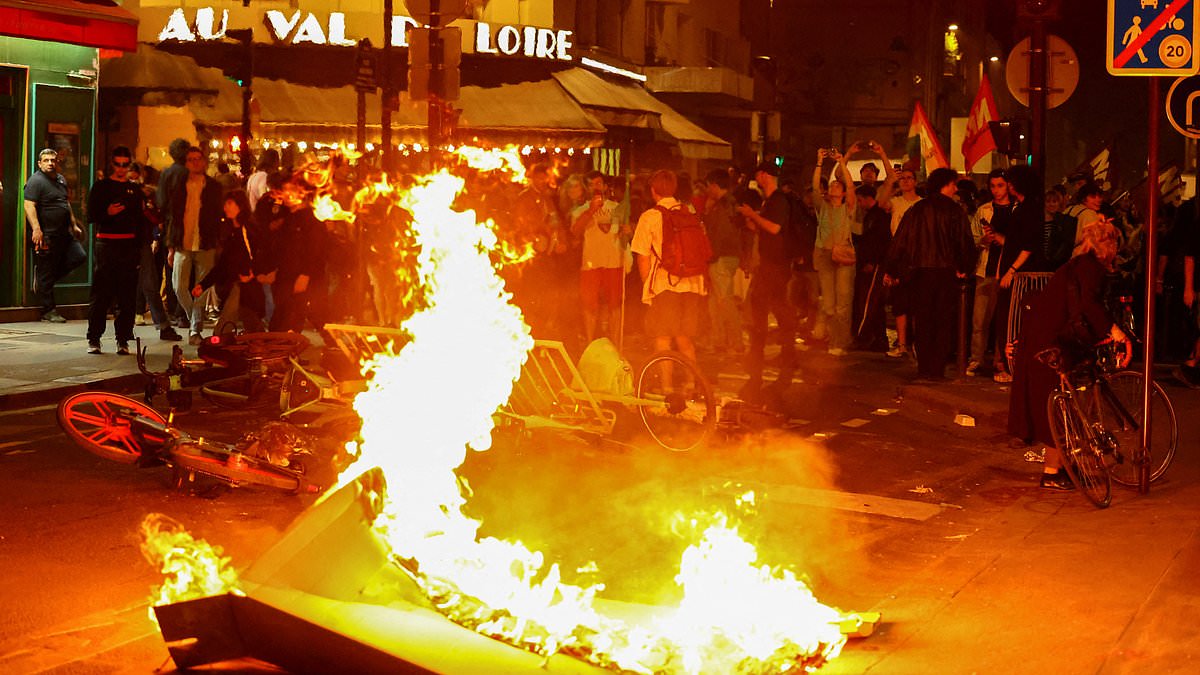France is preparing for more protesting ahead of the second round of parliamentary voting that will take place this morning and is expected to be won by hard-right Marine Le Pen’s National Rally.
Voting began at 8:00am (6:00am GMT) and will continue until 6:00pm, or 8:00pm in major cities, when voting estimates will be released.
It comes as images from Paris last night showed dozens of popular high street stores including Zara and Pull & Bear barricaded behind wooden boards and shutters amid growing fears of left-wing riots exploding on the streets after rioting began engulfing the city last week.
Several central areas within Paris are concerned with the possibility of protests erupting, including Rue de Rivoli, the Opera area, and the Champs-Elysees.
The French Ministry of the Interior has announced the deployment of 30,000 police officers across France, including 5,000 in Paris, to deal with the possible unrest.
Last week, thousands of enraged voters set light to rubbish, smashed up shop windows, and launched fireworks after Marine Le Pen’s National Rally (RN) steamed to victory in the first round of snap parliamentary elections, held on June 30.
Hordes of riot cops were unleashed across Paris, particularly in Place de la Republique, where police were seen clashing with protesters into the early hours of the morning.
The RN netted some 33 per cent of the vote, according to the Interior Ministry, followed by the left-wing New Popular Front alliance with 28 per cent – and incumbent president Emmanuel Macron’s centrist alliance lagging in a distant third on just 20 per cent.
Following the shocking results, Interior Minister Gerald Darmanin said politicians from across the spectrum had faced verbal and physical abuse – often while putting up campaign posters.
He told French broadcaster BFMTV that several of the attacks had been ‘extremely serious’ – with the three-week campaign overshadowed by violence that left some victims in hospital.
Ahead of Sunday’s tense second round of voting, Darmanin confirmed there will be a greater police presence on the streets of Paris as he warned: ‘Outbreaks of violence are to be feared’.
At least 30 suspects from ‘extremely varied backgrounds’ have been arrested so far – with RN candidates and left-wing politicians among those targeted.
It comes as ‘hated’ and ‘unpopular’ Macron was urged by his own party to keep out of the spotlight of his campaign trial when government spokesperson Prisca Thevenot was attacked on Wednesday.
Thevenot, a candidate for the centrist Ensemble alliance led by Macron, said she and a deputy and a party activist were putting up election posters in Meudon near Paris when a group attacked them.
Thevenot’s deputy and the party activist were both dashed to a hospital following the attack.
‘The symbolic violence of words quickly was replaced by physical violence,’ she told reporters while back on the campaign trail Thursday, adding the motive behind the attack was still under investigation.
Marie Dauchy, a RN candidate in Savoy, said she was assaulted Wednesday at a food market while campaigning and announced she was abandoning the race.
Her party’s leader and three-time presidential candidate, Marine Le Pen, said on X, formerly Twitter, that two men had ‘cowardly’ assaulted Dauchy.
Last week’s post-vote protests saw bins uprooted with their contents littered across the tarmac as protesters flooded the streets waving banners and flares.
Young women trying to enjoy nights out in the city were forced to stand behind armoured cops who forced back the activists with batons and tear gas as firefighters were called in to douse the blazes set by protestors.
Should the far-right outfit scoop an absolute majority after the second round of voting today, Macron will be forced to appoint 28-year-old RN President Jordan Bardella as his Prime Minister.
An RN victory would also represent the first time the far-right takes the reins of power in France since the Nazi occupation during WWII.
The last far-right leaders of France were Philippe Pétai and his prime minister, Pierre Laval, who headed the Vichy regime that collaborated with the Nazis during World War II.
A total of 577 constituencies are being decided in the snap election, one for each seat in the National Assembly, the lower house of parliament.
A total of 76 lawmakers were elected in the first round – including 39 representing the RN and its allies – leaving 501 sets up for grabs in the run-off.
France’s 577 seats in the influential National Assembly, the lower house of the country’s parliament, are all up for grabs.
Voting takes place over two rounds, the first of which happened tonight – the second will happen on July 7.
If a candidate in a seat takes more than 50% of the votes in the first round, then they take the seat by an absolute majority. Once the vote has been confirmed, the seat is theirs and they are a member of the National Assembly.
But this rarely happens during the first round, leading to the second round of voting.
During this second round, any candidate that takes more than 12.5% of the vote during the first round is eligible to stand in the second round
Here, the candidate with the most votes wins, even if they get less than 50% of the overall vote. This is known as a plurality vote.
